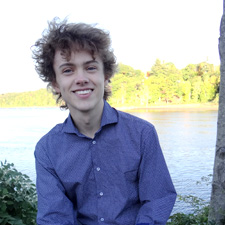Five MCS Students Receive ISURF Awards to Fund Research Abroad
Biological sciences major Ermina Lee, physics major Ian Harris and chemistry majors Travis Fu, William Fahy and Jacob Kim will pursue research at institutions across the world this summer thanks to the help of International Summer Undergraduate Research Fellowships (ISURF) awarded to them by the Carnegie Mellon University Undergraduate Research Office.
ISURFs are supported through the generosity of the Buncher Foundation and help fund students work by off-setting their travel and living costs during the summer months.
The students will spend their summer at universities across Israel and England.
Lee will conduct research at Tel Aviv University with Martin Kupiec, a professor in the university’s Department of Molecular Microbiology and Biotechnology.
Kupiec's lab focuses on a protein called Snf1, which is a central regulator of sugar metabolism in organisms from yeast to plants to humans. Kupiec made a novel discovery that Snf1 activity is controlled by a protein aggregation system; this system is similar to those that control toxic protein aggregation associated with neurodegenerative diseases. Lee will work to understand how the aggregation of Snf1 in yeast cells affects its role in metabolic pathways, with the hope that her results may be applicable to human protein aggregation diseases.
Harris will work with Gilad Perez, a high energy theorist at the Weizmann Institute of Science in Rehovot, Israel, where he plans to study dark matter particle candidates. This analysis may involve drawing and calculating Feynman diagrams or coding numerical simulations to test whether theoretical models align with experiment, he said.
At Carnegie Mellon, Fu conducts polymer research in the lab of Krzysztof Matyjaszewski, J.C. Warner University Professor of Natural Sciences. This summer, he will work with a collaborator of Matyjaszewski's, Michael Silverstein, a professor in the Department of Materials Science and Engineering at Technion University in Haifa, Israel. He’ll be studying the application of star polymers to high internal phase emulsion systems, which have vast applications in sustainable materials, drug delivery and synthetic tissue.
Fahy will further his research in atmospheric chemistry by working with Benjamin Murray, a professor of atmospheric science at the University of Leeds in England. Murray is a collaborator of Fahy’s research advisor at Carnegie Mellon, Ryan Sullivan, associate professor of chemistry and mechanical engineering. Fahy will be working to analyze how volcanic ash influences how ice crystals form in the atmosphere, which has implications for cloud formation, cloud behavior and earth's overall energy budget. He also will be investigating how volcanic ash can be changed by natural atmospheric processes, particularly chemical aging by acids, and how this will change the resulting ice crystal formation.
Kim will be traveling to Brunel University in London to work with Rakesh Kanda, a professor in the Institute of Environment, Health and Societies and College of Health and Life Sciences, on turning naphthenic acids into nontoxic products. Naphthenic acids are a wide group of chemically stable and toxic substances found in crude oil, and they are a particularly severe problem in oil sand processing, which uses a large amount of water that the naphthenic acids dissolve into.
Kanda has previously used TAML catalysts, developed by Carnegie Mellon Teresa Heinz Professor of Green Chemistry Terry Collins, to oxidize certain naphthenic acids into safe products. This summer, Kim will be testing how quickly Collins’ newest TAML catalysts degrade naphthenic acids and whether the products formed are nontoxic.
Upon returning, Lee, Harris, Fu, Fahy and Kim will present their work from the summer at the annual Meeting of the Minds Undergraduate Research Symposium in the spring of 2020.




